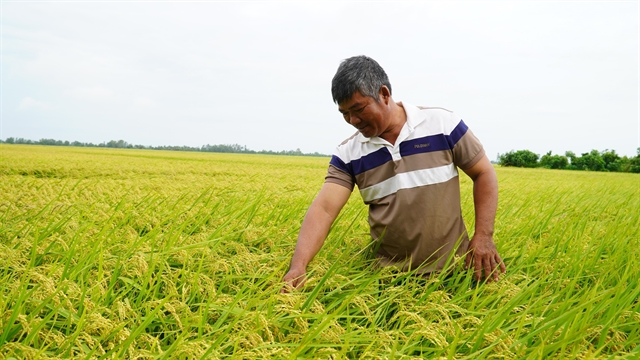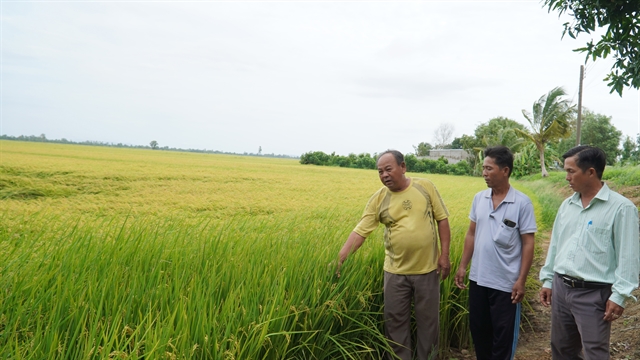Farmers become millionaires after hard work and clever use of resources
Society – Economy - Ngày đăng : 09:54, 21/10/2024
 |
| Dương Văn Sơn, chairman of the Board of Directors of Giồng Tượng Agricultural Service Cooperative, owns 10 hectares of Japanese rice fields, harvesting over 140 tonnes of rice per year. — VNA/VNS Photo Văn Sĩ |
KIÊN GIANG — The agricultural business is booming in Kiên Giang, with thousands of farmers making billions of đồng in annual income, due to the application of new technologies in farming.
One exemplary farmer is Dương Văn Sơn, who lives in Vĩnh Phú Commune, located near the border with Cambodia in the province's Giang Thành District, and who had been providing agricultural services for a decade.
Admired by local authorities and fellow farmers alike, Sơn has been involved in rice farming since his youth, working alongside his parents. He continued working in rice cultivation after starting his own family. At first, he and his wife had only 1.5 hectares of land. But after more than 20 years of work and saving up, the family now owns 11 hectares of rice fields.
Before 2010, the land in Vĩnh Phú and Giang Thành was affected by salinity and acidity, resulting in poor rice yields of around two tonnes per hectare. However, since 2011, the region has transformed due to improved irrigation, additional canal dredging and the introduction of mechanised land cultivation.
Today, Vĩnh Phú produces two rice crops per year: winter-spring and summer-autumn. Winter-spring crops typically yield up to nine tonnes per hectare, while summer-autumn crops yield between six and 6.5 tonnes per hectare.
With nearly 11 hectares of land, Sơn’s family harvests over 150 tonnes of rice annually, generating around VNĐ1.2 billion (US$48,000) in income and VNĐ400 million ($16,000) in profits after expenses.
Aside from rice cultivation, Sơn also owns ploughing and tilling machines to provide agricultural services for local farmers. In 2020, he led the formation of the Giồng Tượng Agricultural Service Cooperative and was elected as chairman.
The 45-member cooperative provides services such as ploughing, tilling, irrigation and fertilisation for its own 217 hectares, as well as for around 150 local farmers with over 500 hectares.
“Joining the cooperative has made rice production more convenient, saving costs while achieving higher yields and increasing profits. Not only members, but also other farmers in the commune have prospered,” Sơn said proudly.
Another farmer known for his sharp business acumen and contributions to the community is Nguyễn Văn Suốt, 61, from Vĩnh Phú. He owns over 20 hectares of rice fields and two barges that transport cement and rice between provinces such as An Giang, Kiên Giang, Cần Thơ and Hậu Giang.
Suốt said that from 1985 to 1990, his family owned nearly two hectares of rice fields. However, low yields and prices at the time made it difficult for farmers to prosper. So the family rented out their fields and invested in barges to purchase rice from farmers and sell it to export companies. Over time, Suốt accumulated enough money to buy more land, and by 2018, they owned over 20 hectares. By 2020, seeing stable rice prices and the availability of technology for rice farming, they stopped leasing the land and resumed direct cultivation.
With 20 hectares of rice fields, Suốt’s family produces around 310 tonnes of rice annually, generating an income of VNĐ2.3 billion ($92,000) and earning around VNĐ700 million ($28,000) in profits. His two barges also provide an additional income of about VNĐ400 million ($16,000) annually.
“Thanks to modern machinery for fertilising and spraying pesticides, my family is now able to manage over 170 fields, which was impossible in the past. With stable rice prices of up to VNĐ8,000 ($0.32) per kilogramme and the Government’s control of agricultural input costs, I believe rice farmers will grow wealthier in the years to come. Rural areas will also develop further,” Suốt noted. His family’s growing income has enabled them to contribute to building roads and other social welfare initiatives in the community.
 |
| Nguyễn Văn Suốt (in yellow shirt), an exemplary farmer from Giang Thành District, owns 20 hectares of rice fields, harvesting twice a year. He also owns two barges used for transporting rice and cement, generating an income of approximately VNĐ2.7 billion (around US$110,000) per year. — VNA/VNS Photo Văn Sĩ |
Timely support policies
According to the Kiên Giang Farmers' Association, the province’s movement of farmers striving for excellent production and business results has expanded, becoming better and more effective. This movement has helped implement the national policies for agricultural and rural development.
In 2023, nearly 78,000 households in the province were recognised for their achievements in production and business. More than 10,000 of these were awarded at provincial and district levels, and over 2,000 households rose out of poverty. By the first nine months of 2024, over 100,000 households had registered to be recognised as excellent farmers.
Lâm Quốc Toàn, deputy chairman of the Kiên Giang Farmers' Association, noted that the movement has fostered solidarity and mutual assistance among farmers, and has helped reduce poverty, contributing to rural socio-economic development and the new rural construction initiative.
To help farmers succeed, the Farmers’ Associations at various levels regularly organise training sessions to teach about new technologies, run agricultural training classes and coordinate with the Social Policy Bank to provide loans for thousands of households. They also facilitate timely disbursement of funds from the Farmers' Support Fund and the National Employment Support Fund.
The association encourages farmers to create groups like farmers' clubs to share knowledge and collaborate in production. They also encourage farmers to form cooperatives, providing guidance on growth strategies, production scale and sector expansion.
Moreover, the association promotes the digitisation of farming practices, helps farmers participate in trade fairs and exhibitions, and connects them with enterprises to supply inputs and secure output markets. These efforts aim to support sustainable production and business growth.
"We are also working on synchronised solutions to support the digital transformation and technology transfer for cooperative members. Farmers are encouraged to participate in trade promotions, connect with businesses and access deferred payments for agricultural inputs, helping them to sustain and grow their businesses," Toàn noted. — VNS
